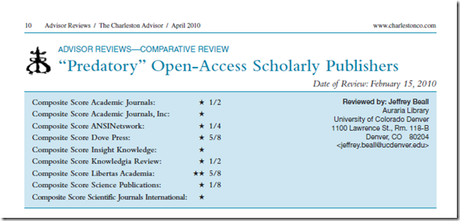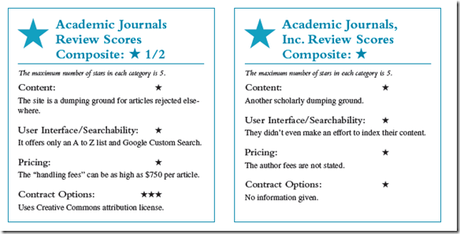
As the whole academic world is lamenting the loss of knowledge to paywalls, there are a bunch of unscrupulous people who are trying to mint money off the OA wave. In what has been termed “Predatory” Open Access by Jeffrey Beal in his fantastic review in The Charleston Advisor, the ploy for these posers has been unmasked.

Their strategy is two pronged:
a. Lure in naïve and struggling academics into publishing with them in exchange of author fees that an extortionist would be ashamed to claim.
b. Invite prominent academics and researchers to review papers for them and act as Editors pro bono to give their scam a façade of credibility.
They seem to be flourishing and spreading like an epidemic, but the main problem is, that some of them charge fees as high as any famed players in the OA field, like the BMC or PLoS Journals.
It goes without saying, these journals are causing an irreparable damage to the face of Open Access and is pushing more and more academics to publish in the safe arena of pay-for-subscription models. But the fact is that there are scamsters on either side of the divide and these OA-extortionists are getting their minute of fame mainly because they have become an embodiment of the dire consequences the OA-naysayers had predicted would spring up. Anyways, without going into THAT debate for the time being, let us come back to the predators…
On his Posterous Blog, Beall has compiled a list of predatory printing presses:
Predatory, Open-Access Publishers
Bentham Open
Insight Knowledge
International Research Journals
Internet Scientific Publications
Libertas Academia
Medwell Journals
Open Journals Publishing
Science Publications
Scientific Journals International
Scientific Research Publishing
Watchlist:
Hindawi Publishing Corporation
The Academic Journal stable has sent me more than a few tempting emails asking me to publish in their journals, and I have always wondered why and how. The first time they did, I was very flattered that an “Iternationally acclaimed publishing house” [sic] was inviting me to publish with them, but a quick scan of their sites threw up more surprises than I had expected. And since them, I have marked them as the SPAM that they are without even giving a second read.
But the truth of the matter is, coming from a place with minimal research exposure, it is difficult to spot these as a scam right away. I know that more than a few academics from places like mine will be lured into submitting with them simply because they are under pressure to publish or perish and their exposure to these elements are minimal, to say the least. The fact remains whether or not they want a vanity publication with the swipe of their credit card is something up to them, but in all honesty, I think it would do their careers more harm than good.
Here is the mathematics of the profit count, with a LOT of help from Beall’s Charleston Advisor review:

The Academic Journals stable comprises of 106 titles, each in various stages of development, with most having ZERO articles published under them. Even the pages like the Editors and Reviewers are hung with cobwebbed “Coming Soon” signs. The websites are clunky and their user interface is utterly useless. As mentioned by Beall, they sport the same Google search bar that we can use HTML to incorporate into our blogs. Heck its easier to search my blog than search an Academic Journal publication!
The few titles that DO have a couple of publications are utterly rubbish. Unfortunately, none of the medical journals that I cared to peruse have anything published in them. So I do not get any fodder to make fun of.
Anyways, the main kicker comes in when they go on to list their contact addresses. Guess where they live? NIGERIA! I know I might be stereotyping a bit when this comes up, but don’t tell me if I told you a potentially scamalicious affair was being cooked up in Nigeria, would you not be all like:

The worst part is that there are people out there who are trying to run legitimate open access journals but thanks to these scammers are meeting with nothing but extreme skepticism and determined resistance from the scientific community.
Closed access may be bad, but in my opinion, predatory open access is even worse!
